

Share
5th June 2016
04:39pm BST

 Let's get one thing straight, Down are pitiful.
They came to Clones off the back of a disastrous league campaign and it looked for all the world like they were already rooting for a kind qualifier match, maybe at home, before the ball was even thrown in. The 70 minutes that followed were ugly. From a Down point of view, at least.
From a football lover's perspective, whilst there might not have been much of a contest in that Ulster quarter-final, it was lit up beautifully by Conor McManus. It was lit up by football at its pure, most reduced best.
Let's get one thing straight, Down are pitiful.
They came to Clones off the back of a disastrous league campaign and it looked for all the world like they were already rooting for a kind qualifier match, maybe at home, before the ball was even thrown in. The 70 minutes that followed were ugly. From a Down point of view, at least.
From a football lover's perspective, whilst there might not have been much of a contest in that Ulster quarter-final, it was lit up beautifully by Conor McManus. It was lit up by football at its pure, most reduced best.
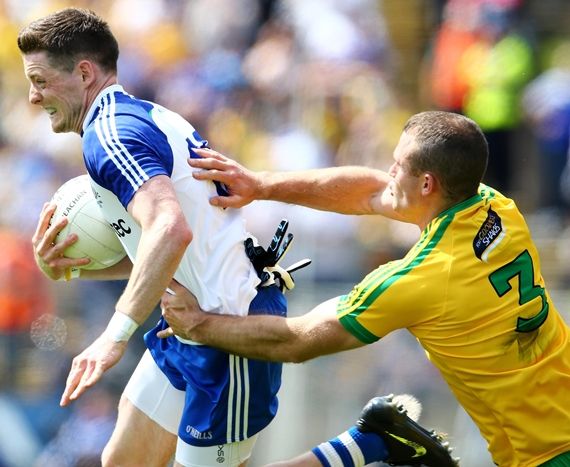 Monaghan won the ball, they overran Down far too easily and then they kicked the thing in to Conor McManus and it really was as simple as that.
Sweepers or not, double markers or not, tackles and fouls aside, the Clontibret man was at his effortless best yet again.
After a league campaign that had journalists and pundits scouring the thesaurus trying to see if there were indeed any more superlatives, after an Ulster-winning championship campaign in which the best player in the country was screwed out of even a top three nomination for Footballer of the Year because Monaghan obviously didn't get far enough, Conor McManus is back in the habit and the habit is downright ruthless at this stage.
Monaghan won the ball, they overran Down far too easily and then they kicked the thing in to Conor McManus and it really was as simple as that.
Sweepers or not, double markers or not, tackles and fouls aside, the Clontibret man was at his effortless best yet again.
After a league campaign that had journalists and pundits scouring the thesaurus trying to see if there were indeed any more superlatives, after an Ulster-winning championship campaign in which the best player in the country was screwed out of even a top three nomination for Footballer of the Year because Monaghan obviously didn't get far enough, Conor McManus is back in the habit and the habit is downright ruthless at this stage.
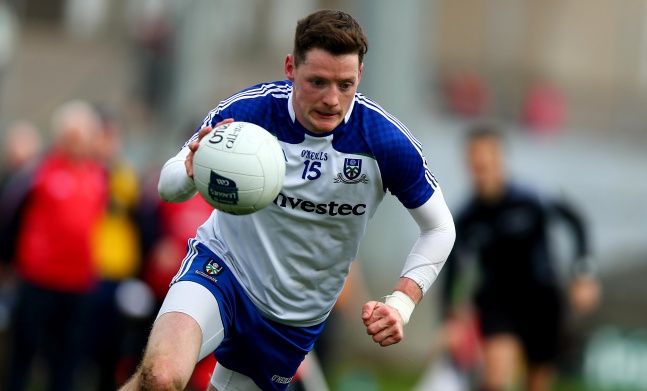 Where other forwards have their day when it doesn't really matter, where we're all guilty of making excuses for the rest of them because of defensive systems, because of conditioning, because of cynical play, this man is unmoved. Undeterred. Unstoppable.
Conor McManus is an oasis of traditional class surviving with grace in the harsh climate of modern day football.
He's a throwback to the textbook corner forward that they said would go extinct amidst the blanket defences and deliberate fouls. He wins ball, he turns, he spins, he takes men on, he draws tacklers and support runs, he kicks points from both sides of the pitch with laughable ease.
Now, he's a leader of men.
Where other forwards have their day when it doesn't really matter, where we're all guilty of making excuses for the rest of them because of defensive systems, because of conditioning, because of cynical play, this man is unmoved. Undeterred. Unstoppable.
Conor McManus is an oasis of traditional class surviving with grace in the harsh climate of modern day football.
He's a throwback to the textbook corner forward that they said would go extinct amidst the blanket defences and deliberate fouls. He wins ball, he turns, he spins, he takes men on, he draws tacklers and support runs, he kicks points from both sides of the pitch with laughable ease.
Now, he's a leader of men.
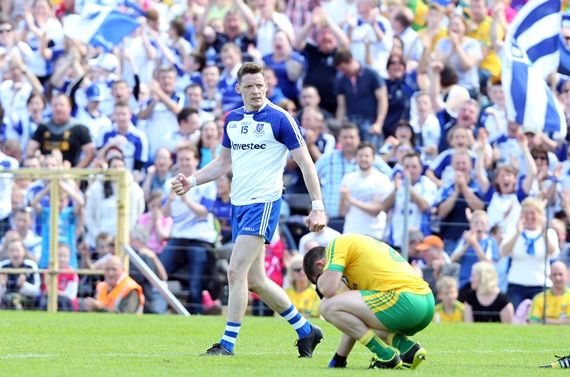 Last year, he marched the Farney men out to battle in the Ulster final with Donegal and he led from the front in what was the most exhilarating individual performance for a decade.
He had one of the toughest man-markers in Neil McGee hanging off him for 70 minutes. He had one of the toughest man-markers in Paddy McGrath sharing shorts with him as well and he had the rest of that Donegal blanket swarming all over but they couldn't silence him. They couldn't stop him from taking all the leg room he liked.
Even with Ryan and Mark McHugh roaming around the backline, with Karl Lacey firefighting where he wanted to and the yellow jerseys at times throwing 15 men behind the ball, McManus found pockets of space and, bit by bit, blow by blow, he brought Donegal to their knees.
Last year, he marched the Farney men out to battle in the Ulster final with Donegal and he led from the front in what was the most exhilarating individual performance for a decade.
He had one of the toughest man-markers in Neil McGee hanging off him for 70 minutes. He had one of the toughest man-markers in Paddy McGrath sharing shorts with him as well and he had the rest of that Donegal blanket swarming all over but they couldn't silence him. They couldn't stop him from taking all the leg room he liked.
Even with Ryan and Mark McHugh roaming around the backline, with Karl Lacey firefighting where he wanted to and the yellow jerseys at times throwing 15 men behind the ball, McManus found pockets of space and, bit by bit, blow by blow, he brought Donegal to their knees.
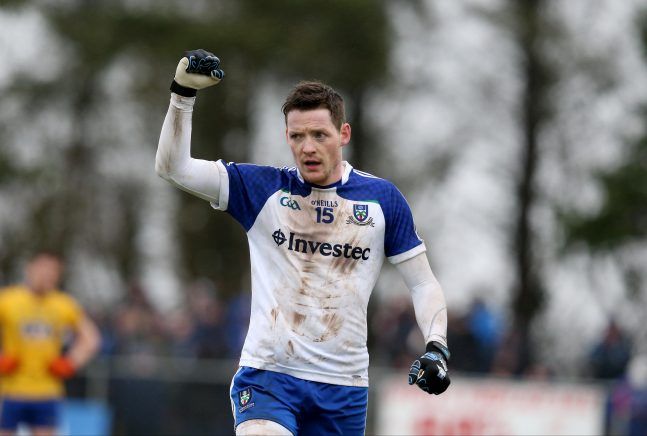 Against Tyrone, he fought all alone inside their vicious rearguard and he competed against a referee caught up in the physical occasion. If one foul wasn't enough for him, McManus held onto the ball for all his life until he was fouled two or three more times to convince the official. Tyrone strangled Monaghan that day but their iconic number 15 never once winced. He never once wandered. He waited and waited and sprang to life in the full forward line where Malachy O'Rourke needed him.
In an era in which the like of Jamie Clarke was being trialled at half back, in which Aidan O'Shea's days of havoc in the full forward line were and are inevitably numbered as August annually approaches, McManus and O'Rourke persist on doing what so many others fail to do these days: they get the best out of their most dangerous player in the most dangerous area of the field.
Such is McManus' class though that he doesn't need as much breathing room as anyone else. He survives with less oxygen than a lesser man could even joke about. And, still, feeding off scraps, he's unforgivably deadly.
Against Tyrone, he fought all alone inside their vicious rearguard and he competed against a referee caught up in the physical occasion. If one foul wasn't enough for him, McManus held onto the ball for all his life until he was fouled two or three more times to convince the official. Tyrone strangled Monaghan that day but their iconic number 15 never once winced. He never once wandered. He waited and waited and sprang to life in the full forward line where Malachy O'Rourke needed him.
In an era in which the like of Jamie Clarke was being trialled at half back, in which Aidan O'Shea's days of havoc in the full forward line were and are inevitably numbered as August annually approaches, McManus and O'Rourke persist on doing what so many others fail to do these days: they get the best out of their most dangerous player in the most dangerous area of the field.
Such is McManus' class though that he doesn't need as much breathing room as anyone else. He survives with less oxygen than a lesser man could even joke about. And, still, feeding off scraps, he's unforgivably deadly.
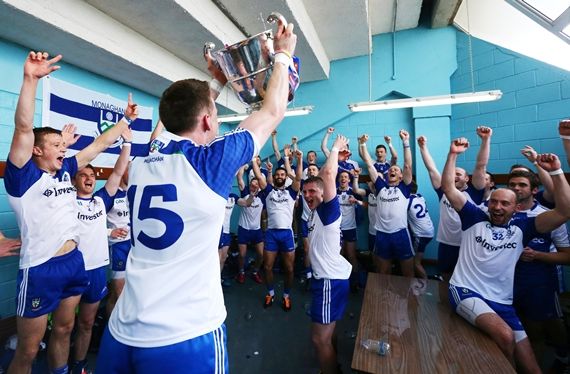 Stand behind the goals and watch Conor McManus. Watch him prowl along the 13-metre line, biding his time, playing dead before bursting into beautiful life. Watch him wriggle free of the attention of four and six hands, win ball and produce magic where he wants to produce it - not in pointless areas of the field.
Watch him curl set pieces between the posts as if he had practiced them countless times during endless summer evenings in Clontibret. Watch him take on the big score - the one he has no right to even be thinking about. Watch him take on the responsibility of dragging his team from the trenches in their hour of need.
Conor McManus, right now, is the most important player in Gaelic Football.
He's having a bigger direct influence on his team than the Michael Murphys and the Aidan O'Sheas of this world - even the Diarmuid Connollys.
But Conor McManus isn't just important for Monaghan. At a time when the training ratio of squats to kicking a football is probably 10:1, Conor McManus defies the modern idea that athleticism is all that matters.
Him and his team bring us back to an age where football is key and where talent is currency, and ripping Down to bloody shreds on Sunday was only the start of it.
Conor McManus isn't just important for Monaghan. He's important for the game.
He's important for those young kids watching on maybe half-deciding to pick up a ball. He's important for anyone who doesn't believe anymore.
Stand behind the goals and watch Conor McManus. Watch him prowl along the 13-metre line, biding his time, playing dead before bursting into beautiful life. Watch him wriggle free of the attention of four and six hands, win ball and produce magic where he wants to produce it - not in pointless areas of the field.
Watch him curl set pieces between the posts as if he had practiced them countless times during endless summer evenings in Clontibret. Watch him take on the big score - the one he has no right to even be thinking about. Watch him take on the responsibility of dragging his team from the trenches in their hour of need.
Conor McManus, right now, is the most important player in Gaelic Football.
He's having a bigger direct influence on his team than the Michael Murphys and the Aidan O'Sheas of this world - even the Diarmuid Connollys.
But Conor McManus isn't just important for Monaghan. At a time when the training ratio of squats to kicking a football is probably 10:1, Conor McManus defies the modern idea that athleticism is all that matters.
Him and his team bring us back to an age where football is key and where talent is currency, and ripping Down to bloody shreds on Sunday was only the start of it.
Conor McManus isn't just important for Monaghan. He's important for the game.
He's important for those young kids watching on maybe half-deciding to pick up a ball. He's important for anyone who doesn't believe anymore.

Explore more on these topics: